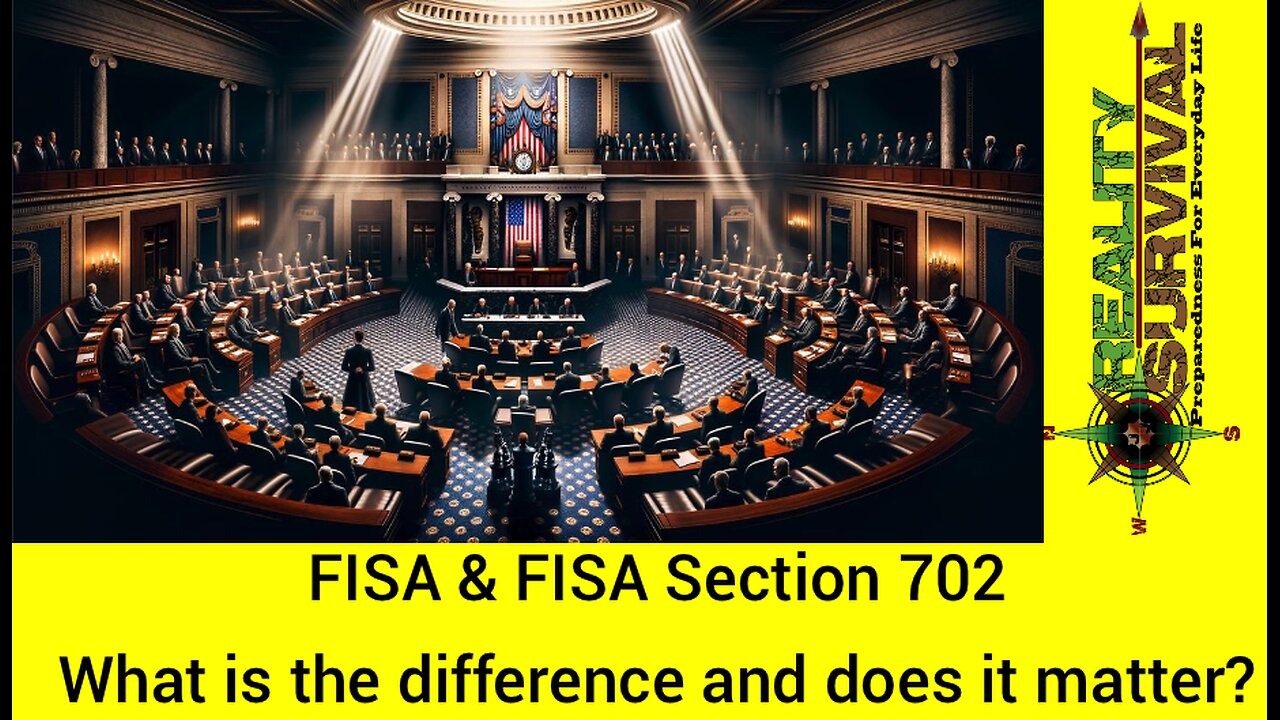Premium Only Content

FISA & FISA Section 702 - A Call To Action
The Foreign Intelligence Surveillance Act (FISA) of 1978 establishes a framework for the surveillance and collection of foreign intelligence information in the United States.
A normal FISA warrant typically targets specific individuals who are believed to be foreign powers or agents of foreign powers. This can include non-U.S. citizens and U.S. citizens.
Purpose: The purpose of the surveillance must be to obtain foreign intelligence information.
Court Approval: The surveillance requires approval from the Foreign Intelligence Surveillance Court (FISC). The application for a FISA warrant must demonstrate probable cause that the target is a foreign power or an agent thereof.
Procedure: The application process is rigorous and must be reviewed and approved by multiple officials, including the Attorney General.
Scope: The surveillance is specific to the individual named in the warrant, and there are strict minimization procedures in place to protect the incidental collection of information related to U.S. citizens.
Target: Section 702 permits the targeting of non-U.S. citizens located outside the United States for the purpose of collecting foreign intelligence information. No warrant is required to target these individuals, even if the surveillance happens to capture their communications with U.S. citizens.
Purpose: The goal is broadly to acquire foreign intelligence information, which can include a wide range of data relevant to national security, foreign affairs, or other significant national issues.
Court Approval: Section 702 does not require individual court orders for each target. Instead, the FISC approves annual certifications that specify categories of foreign intelligence information to be collected.
Procedure: The Attorney General and the Director of National Intelligence issue these certifications, and there are compliance reviews to ensure the minimization of information about U.S. persons.
Scope: The scope of surveillance under Section 702 is broader and can include sweeping up large amounts of data incidentally from U.S. citizens if they are communicating with foreign targets.
The "unmasking" procedure under FISA Section 702 involves revealing the identity of a U.S. citizen whose information is incidentally collected during the surveillance of foreign targets. Here is a general outline of how unmasking works:
Incidental Collection
Under Section 702, the U.S. government conducts surveillance targeting non-U.S. persons located outside the United States to collect foreign intelligence information. In the process, communications to or from U.S. citizens may be incidentally collected if they are in contact with the foreign targets.
Minimization and Masking
Initially, any identifiable information about U.S. persons is "masked" to protect their privacy. This typically means that their names or other identifying details are replaced with generic identifiers like "U.S. Person 1" in intelligence reports.
Request for Unmasking
If a U.S. government official who is reading an intelligence report believes that knowing the U.S. person's identity is necessary to understand the foreign intelligence information or assess its importance, they can request that the person’s identity be unmasked.
The request must be made in writing and must specify why the identity of the U.S. person is needed. The official must demonstrate that the unmasking is essential to fulfill their official duties.
Approval of Unmasking
The request is reviewed by the agency that originally masked the identity, such as the NSA or the FBI. This review checks the justification for unmasking to ensure it meets legal standards and policy requirements.
Only a limited number of senior officials have the authority to approve unmasking requests. These officials are typically high up in the agency’s chain of command, such as the Director or Deputy Director.
Access to Unmasked Information
If the unmasking request is approved, the identity of the U.S. person is made available to the requesting official. The unmasked information is still treated with a high level of confidentiality and is only shared with those who have a need to know in order to perform their duties.
Oversight and Compliance
The entire process is subject to oversight by the FISC, as well as internal compliance mechanisms within each intelligence agency. Additionally, the Office of the Director of National Intelligence (ODNI) periodically reviews compliance with the minimization and unmasking procedures.
Unmasking is intended to be a carefully controlled process that balances the government's need for information relevant to national security with the protection of individual privacy rights.
The opinions expressed in this video are those of the author and do not imply or convey any endorsement by the Department of Defense or the United States government. Additionally, this video was recorded and uploaded during off duty hours and did not utilize any government resources or facilities.
-
 11:57
11:57
inspirePlay
17 hours ago $4.44 earnedLongest Drive Wins! Elite Long Drivers Battle in Par 4 Elimination
27.7K4 -
 8:44
8:44
RTT: Guns & Gear
19 hours ago $1.92 earnedStreamlight TLR RM2 Laser - G | The Best PCC Light
17.4K -
 36:38
36:38
Athlete & Artist Show
1 month ago $1.78 earnedNCAA Hockey Was A Joke, TNT Hockey Panel Is The Best In Sports
20.2K1 -
 1:00:08
1:00:08
Trumpet Daily
22 hours ago $4.08 earnedBanning Mystery of the Ages - Trumpet Daily | Jan. 17, 2025
10.6K16 -
 15:10
15:10
Chris From The 740
1 day ago $0.78 earnedEAA Girsan Disruptor X 500-Round Review: Is It Reliable?
7.92K -
 1:00:38
1:00:38
PMG
17 hours ago $3.04 earnedCarnivore & Dr. Shawn Baker - Health Starts With Food
27.6K3 -
 1:28:13
1:28:13
Kim Iversen
18 hours agoCancelled Chef Pete Evans Exposes The One Change That Could End Big Food and Pharma
95.8K87 -
 4:20:21
4:20:21
Nerdrotic
19 hours ago $82.22 earnedDaradevil Born Again, Comics Industry CRASH, Neu-Hollywood REBUILD | Friday Night Tights #337
249K63 -
 1:32:34
1:32:34
Glenn Greenwald
15 hours agoThe Future of Gaza With Abubaker Abed; Journalist Sam Husseini On His Physical Expulsion From Blinken’s Briefing & Biden’s Gaza Legacy | System Update #391
131K100 -
 1:34:48
1:34:48
Roseanne Barr
18 hours ago $26.27 earnedWe are so F*cking Punk Rock! with Drea de Matteo | The Roseanne Barr Podcast #83
101K83